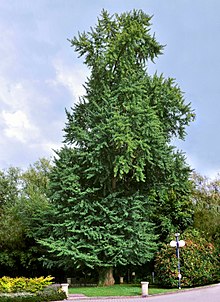 Study: Authentication of Ginkgo biloba herbal dietary supplements using DNA barcoding by Dr. Damon Little of The New York Botanical Garden
Study: Authentication of Ginkgo biloba herbal dietary supplements using DNA barcoding by Dr. Damon Little of The New York Botanical Garden
Dr. Damon Little, Associate Curator of Bioinformatics in the Cullman
Program for Molecular Systematics at The New York Botanical Garden, has
just published a new study in the journal Genome investigating the use of DNA barcoding to test the authenticity of Ginkgo biloba (G. biloba),
an herbal dietary supplement sold to consumers that is supposed to
boost cognitive capacity. Unfortunately, herbal supplements on the
market are subject to mislabelling, and therefore consumers may not be
getting the products and benefits they believe they are getting.Dr. Little’s research is part of a larger effort to evaluate many of the popular herbal supplements on the retail market. He explains two potential dangers of mislabelled supplements: (1) some adulterants are toxic (alone or in combination with other supplements/drugs); and (2) consumers may not receive the health benefit they seek from mislabelled supplements, potentially worsening their health.
It seems herbal products can be mislabelled either because the supplier incorrectly identified the plant materials (some grow their own materials; some contract with growers; some buy raw materials in bulk; and some buy processed materials in bulk) or because another (usually less expensive) material was substituted.
Although it is difficult to determine how or why a supplement is mislabelled, the process developed with this new research can help to estimate the frequency of mislabelled supplements on the market. It also provides a validated method that can be used by supplement manufacturers for better quality control.
Dr. Little has designed a novel DNA mini-barcode assay that can validate authenticity of G. biloba in herbal dietary supplements.
“I found that 83.8% of ginkgo supplements certainly contained ginkgo. In comparison, previous work has shown that 75% of black cohosh (Actaea racemosa) and 85% of saw palmetto (Serenoa repens) supplements contained the correct species,” says Dr. Little. “For the supplements in which I found no evidence of ginkgo, I cannot be sure if that is because the DNA was destroyed (for example by drying at very high temperatures) or if the samples simply do not contain any ginkgo.”
In any case, it is hoped that this assay will be used by supplement manufacturers to ensure their supplements contain the expected ingredients.
Dr. Little intends to continue this line of research with a focus on other popular herbal supplements.
“Authentication of Ginkgo biloba herbal dietary supplements using DNA barcoding” was published online today in the journal Genome.
Source: journal Genome


No comments:
Post a Comment